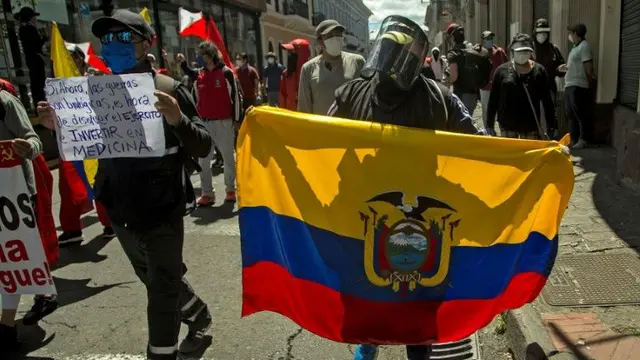Demonstrators defied coronavirus restrictions to march in cities across Ecuador on Monday in protest against President Lenin Moreno's drastic economic measures to tackle the crisis.
As the coronavirus outbreak in Ecuador's largest city of Guayaquil begins to stabilize, the government is bracing for worsening spread in the highland capital Quito, where at least six people have died in the streets in the past month.
Starting March 16, borders were completely closed, including to citizens and residents, for 21 days. The government also extended lockdown measures to May 31.
Moreno last week announced public spending cuts including the closure of state companies and embassies around the world, but trade unions Monday said workers were paying a disproportionate price compared to Ecuador's elite.
"This protest is because the government is firing workers to avoid making the rich pay," Mecias Tatamuez, head of the county's largest union, the Unitary Front of Workers (FUT), told reporters at a march in Quito.
Around 2,000 people marched in the capital, waving flags and banners and shouting anti-government slogans.
The protesters wore masks and respected distancing measures recommended against the spread of the coronavirus that has caused at least 3,200 deaths in the country, making it South America's worst-hit nation in terms of infection numbers. Authorities say more than 2,000 further deaths are likely linked to the virus.
Demonstrations took place in several other cities, including Guayaquil, the epicenter of Ecuador's health crisis, where union leaders said hundreds marched through the city.
Moreno ordered the closure of Ecuadoran embassies abroad, a reduction in their diplomatic staff and scrapped seven state companies as part of measures designed to save some 4 billion U.S. dollars. He also announced the liquidation of Ecuador's largest airline TAME airline, which has lost more than 400 million U.S dollars over the last five years.
The government said the pandemic has so far cost the economy at least 8 billion U.S. dollars. Public sector's working hours have been cut by 25 percent, with an accompanying 16 percent pay cut. Moreno said on Sunday that 150,000 people had lost their jobs because of the coronavirus.
Ecuador was struggling economically before the pandemic hit, due to high debt and its dependence on oil. The International Monetary Fund (IMF) predicted that the economy will shrink by 6.3 percent this year, the sharpest drop of any country in South America.
The death toll in Ecuador during the outbreak was 15 times higher than the official number of COVID-19 deaths reported by the government, according to an analysis of mortality data by The New York Times.
The numbers suggest that the South American country is suffering one of the worst outbreaks in the world.
(ASIA PACIFIC DAILY)
 简体中文
简体中文

